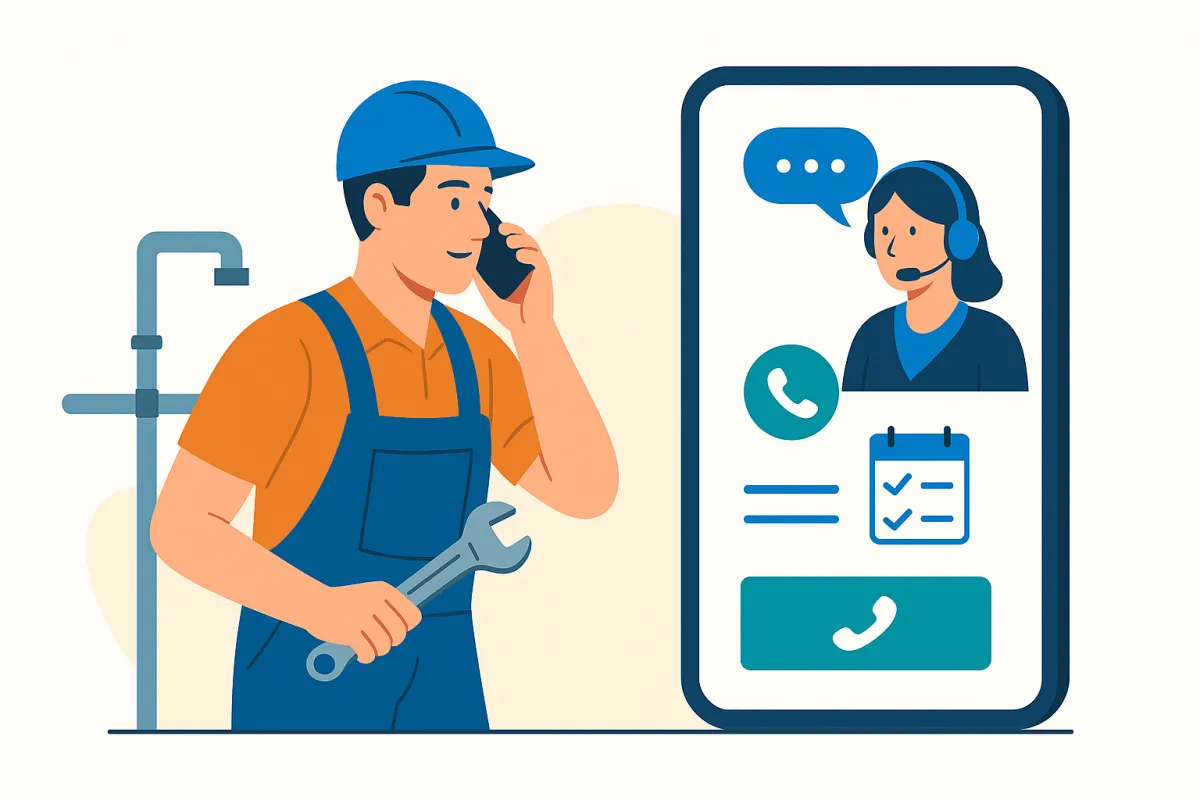
AI Receptionist for Tradies: Complete Business Guide Australia
An AI receptionist answers every call, books jobs, and handles customer enquiries so tradies never lose work while they’re on the tools. For Australian service businesses, it’s often cheaper and more reliable than hiring admin staff or using a live answering service, delivering fast ROI with minimal setup.
Introduction: Missed Calls = Missed Jobs
Every tradie knows the pain of juggling tools in one hand and a ringing phone in the other. The reality? Most calls that hit voicemail don’t turn into jobs. According to studies, over 80% of customers won’t leave a voicemail, and in competitive trades like plumbing or electrical, that means the caller just moves on to the next Google listing.
Hiring a receptionist sounds like the obvious fix, but admin staff are expensive, hard to retain, and only work business hours. Virtual receptionist services fill some of the gap but come with their own limits. That’s where an AI receptionist comes in: always available, trained for your trade, and built to book jobs while you keep working.
This guide breaks down how AI receptionists work for Australian tradies, the costs, ROI, pros and cons, and practical steps to get started.
What is an AI Receptionist?
An AI receptionist is a voice-based assistant that answers incoming calls, understands customer requests, responds with natural conversation, and takes action — such as booking a job, confirming a quote request, or sending an SMS summary.
Unlike voicemail or call centres, it runs 24/7, integrates with job management platforms like ServiceM8, Fergus, or Tradify, and filters out spam calls so you only get the important jobs.
For tradies, that means:
No more lost leads from missed calls
Less time wasted on FAQs and tyre-kickers
Jobs booked directly in your calendar while you’re on-site
Why Australian Tradies Need It
Rising Cost of Admin Staff
The average wage for an entry-level receptionist in Australia is around $55,000–$60,000 per year plus on-costs (super, training, leave cover). For small trade businesses, that’s often more than the owner pays themselves.
Customer Expectations for Instant Response
Australians now expect near-instant replies. Research shows that a tradie who answers within 5 minutes is up to 8 times more likely to win the job compared to someone who calls back later.
Ad Spend ROI Leakage
Many tradies invest heavily in Google Ads and SEO. But when a lead calls and gets voicemail, that money is wasted. An AI receptionist protects that spend by ensuring every call is answered.
Burnout and Work-Life Balance
Evenings shouldn’t mean catching up on missed calls. With an AI receptionist, calls can be answered after-hours, and the tradie can focus on family or rest.
Cost Breakdown: AI Receptionist vs Alternatives
When deciding how to handle incoming calls, Australian tradies typically weigh up four options: AI receptionist, live receptionist service, in-house staff, or simply relying on voicemail. Each has very different costs and outcomes.
AI receptionist: A solution like Fully Booked generally involves a one-off setup fee of around $2,500 for a fully trained and customised solution, followed by an ongoing monthly subscription from $500 depending on call volume. The benefit is 24/7 availability, automated booking, and integration with your job management software. For many trades, just one or two saved jobs each month covers the cost.
Live receptionist service: Providers such as OfficeHQ start from about $30 per week base, with additional charges for every call handled. This can be attractive for businesses with very low call volumes, but it usually only covers business hours. For tradies who get after-hours calls or rely on fast response times, these services quickly become expensive and still leave gaps.
In-house receptionist: Hiring your own staff member remains the most traditional route. In Australia, that typically means $55,000 to $70,000 per year once you add superannuation, leave, and training costs. This option gives you human flexibility and control, but it’s often more than a small trade business can justify, especially if call volume doesn’t stay consistent year-round.
Voicemail or DIY: The cheapest option is to do nothing and let calls roll to voicemail. While there are no direct costs, the hidden cost is substantial. Studies show that more than half of callers won’t leave a message, which means thousands of dollars in lost revenue each month if those leads go to competitors.
For most tradies, the choice comes down to whether they want to invest upfront in a system that prevents missed jobs (AI), pay a recurring premium for human receptionists, or accept the ongoing revenue leakage of voicemail.
ROI Case Study: One Extra Job Covers the Cost
Let’s take a plumbing business in Sydney:
Avg job value: $500
Calls per week: 50
Missed calls: 10 (20%)
Jobs lost per week: 3–4
Revenue lost per month: ~$6,000–$8,000
If an AI receptionist saves just 2 jobs per month, that’s $1,000 ROI immediately, covering its ongoing cost. Anything above that is pure upside.
This aligns with the Fully Booked model where just 1 extra job/month pays for the system.
Pros and Cons: AI vs Human Receptionists
AI Receptionist
Pros:
Available 24/7 (after-hours, weekends, holidays)
Lower cost than hiring staff
Consistent professionalism (no sick days, no training issues)
Filters spam and tyre-kicker calls
Direct integration with CRMs and job platforms
Cons:
May not suit businesses needing complex, human nuance in every call
Some customers still prefer speaking to a live human
Initial setup cost higher than virtual receptionist
Live Virtual Receptionist
Pros:
Human touch and flexibility for unusual calls
Lower upfront cost than AI
Good for low call volumes
Cons:
Only available during business hours
Still more expensive long-term than AI for high volume
Limited ability to integrate with systems or automate bookings
How AI Receptionists Integrate with Job Management Platforms
Most tradies already use tools like ServiceM8, Fergus, or Tradify to schedule jobs and issue invoices. An AI receptionist plugs directly into these systems or into Google Calendar.
Example:
Customer calls and says, “I need someone to fix a leaking tap in Dee Why tomorrow morning.”
AI checks calendar, offers available slot, confirms job.
Job is created in ServiceM8, and tradie gets an instant notification.
No call backs. No double handling. Just jobs booked.
For more detail, see our companion post: AI Receptionist Australia: Setup Guide.
FAQ
Q: How long does it take to set up an AI receptionist?
Most systems can be live within 2 weeks, including training the AI on your FAQs and linking to your calendar.
Q: Is it legal to use AI for answering calls in Australia?
Yes. As long as you disclose you are recording calls, there are no legal issues.
Q: Can AI receptionists handle emergencies?
Yes, with call logic. For example, urgent plumbing jobs can be escalated directly to the tradie’s mobile.
Q: Will customers know they’re talking to AI?
Not necessarily. Modern AI voices sound natural, and many customers assume it’s a staff member but we always disclose its AI upfront so customer's don't lose trust.
Key Facts: AI Receptionist for Tradies
Setup cost: ~$2,500 AUD
Monthly cost: ~$500 AUD
Break-even: Often just 1–2 jobs/month
Availability: 24/7, including after-hours
Top platforms: ServiceM8, Fergus, Tradify, Google Calendar
Main outcome: More jobs booked, less admin, fewer missed leads
Closing Summary
For Australian tradies, every missed call is a missed job. Hiring admin staff or relying on voicemail is no longer enough. An AI receptionist delivers round-the-clock call coverage, books jobs directly into your system, and pays for itself with just one extra job a month.
If you want a deeper dive into the financials, read our AI Receptionist Australia: 2025 Cost & Setup Guide for Tradies. Or, if you’re ready to explore how this can plug into your own systems, check out our cornerstone guide: AI Receptionist Australia page and book a demo.

